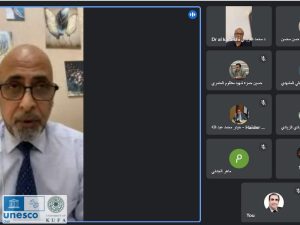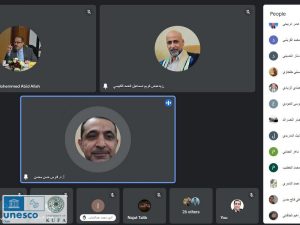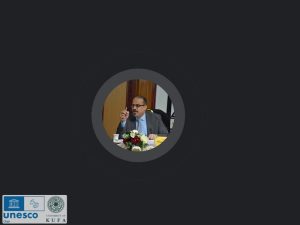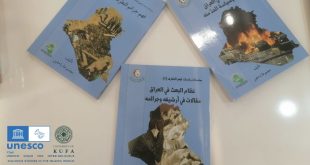Sponsored by the University of Kufa President, Prof. Yasir Lafta Hassoun. The UNESCO Chair for Dialogue at the University, in cooperation with the Karbala Center for Studies and Research at the al-Hussainiya Holy Shrine, held the electronic symposium tagged: The Arbaeen Visit and its Human Dimensions in the Living Heritage of UNESCO.
The symposium was managed by Dr. Zaid Abbas Karim/ UNESCO Chair. Dr. Fares Al-Sultani/the University of Kufa, Dr. Muhammad Al-Quraishi/Adviser to the UNESCO Chair, and Dr. Haider Muhammad Al-Karbalai/Karbala Center for Studies and Research were the lecturers. The symposium was hosted at Google Meet on Saturday, September 9, 2022, at 5 p.m.
At the beginning of the symposium, Dr. Alaa Shatnan, the Director of the UNESCO Chair for Dialogue, speech on the role of the UNESCO Chair for Dialogue in scientific interaction with all humanitarian issues that contribute to raising the level of dialogue for tolerance and community peacebuilding in Iraq. In his introduction, he talked about the spiritual and moral aspects of the Arbaeen Visit. This is what led UNESCO to put The Arbaeen Visit on its list of intangible cultural heritage.
Then began the work of the symposium with a paper tagged (philosophy of the Arbaeen Visit ) by Professor Dr. Fares Al-Sultani of the Faculty of Education at Kufa University. He talked about what Karbala meant to people and all the spiritual meanings it has had over time. These spiritual meanings are seen through mental thinking and shown in Husseiniya rituals, such as The Arbaeen Visit, which combine the spiritual and intellectual aspects.
In his paper entitled ” International and National Prospects for the Arbaeen Visit”, Dr. Muhammad Al-Quraishi spoke about the symbolism of the Arbaeen Visit and how the visit was able to attract the attention of the world and the international community, including UNESCO, prompting many of the world’s research centers to study the visit as a social phenomenon and to look for its impact on the development of Shiaa community especially and Iraqi society in general. He explained how to invest in this symbolism and turn it into a creative act.
Lastly, Dr. Haider Muhammad Al-Karbalai of the Karbala Center for Studies and Research talked about the Center’s role and its tireless efforts to prepare and present the file of The Arbaeen Visit to UNESCO for inclusion in the list of intangible world heritage, in cooperation with the Ministry of Culture, Tourism, and Archaeology to support The Arbaeen Visit file and insert it internationally.
At the end of the meeting, it was suggested that these kinds of events should get more scientific and academic attention. At the same time, more research should be done on the Arbaeen Visit because it was such an important social and religious event that it has become the focus of many international organizations, including UNESCO, research centers, and international media.
Translated into English by Shaima Adnan.
 UNESCO CHAIR For Inter-Religious Dialogue Studies in The Islamic World
UNESCO CHAIR For Inter-Religious Dialogue Studies in The Islamic World





